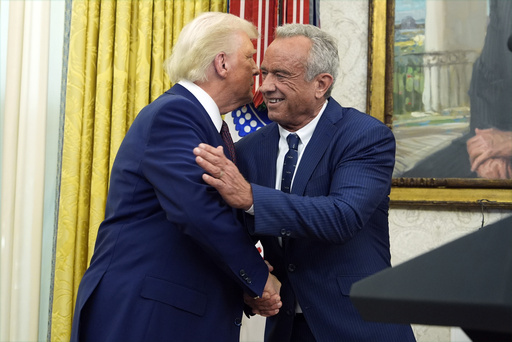In a significant development in the realm of public health, Robert F. Kennedy Jr. has sparked considerable attention by hinting at possible changes to the U.S. vaccination guidelines, despite previously assuring a senator he would maintain the current vaccination schedule. This promise came as part of his campaign to secure the position of health secretary.
On Tuesday, during a welcome ceremony held at the Health and Human Services (HHS) headquarters in Washington, Kennedy addressed thousands of agency employees. His speech included a pledge to thoroughly examine the childhood vaccination schedule designed to combat serious diseases such as measles and polio. He emphasized that no subject would be off-limits for investigation, extending the inquiry to include various health-related issues like pesticide use, food additives, microplastics, and the health impacts of electromagnetic radiation from devices.
Kennedy’s speech came at a critical time as West Texas faces a measles outbreak primarily affecting unvaccinated individuals. This event followed a weekend marked by significant layoffs within the HHS, with more reductions anticipated. In his remarks, he unveiled plans for a new initiative, called the “Make America Healthy Again” commission, which has been directed to evaluate the impact of vaccines, pesticides, and antidepressants on the increase of chronic health issues like diabetes and obesity in America. This commission was established through an executive order signed by Donald Trump just after Kennedy was sworn in.
The executive order specifies that the commission will consist of members from the cabinet and other officials, tasked with formulating a strategy regarding children’s health within a six-month timeframe. Kennedy indicated that the focus would include previously unexamined or overlooked topics related to childhood vaccinations.
Though Kennedy did not directly propose alterations to the current vaccination schedule, his announcement raises questions about his adherence to the commitments made to Republican Senator Bill Cassidy of Louisiana, who expressed concerns about Kennedy’s background in vaccine skepticism. Cassidy eventually supported Kennedy’s nomination after receiving assurances that the federal vaccination approach would remain unchanged.
In his Senate address, Cassidy noted the widely accepted scientific consensus on vaccines, affirming that they are effective and safe for public health. He emphasized the well-documented record of FDA-approved vaccines in preventing diseases through rigorous studies and long-term monitoring. In past communications, Kennedy committed to respecting the recommendations of the CDC’s Advisory Committee on Immunization Practices, which provides guidelines that pediatricians across the nation use to recommend vaccination schedules for children.
When approached for comment regarding Kennedy’s recent statements, Cassidy’s office opted not to provide a response. Kennedy has cultivated a dedicated following through his nonprofit, which has questioned COVID-19 health protocols and vaccine regimens. Throughout his confirmation hearings, he attempted to clarify that he does not identify as “anti-vaccine.”
However, Dr. Paul Offit, an infectious disease specialist at the Children’s Hospital of Philadelphia and a member of a federal vaccine advisory panel, voiced skepticism about Kennedy’s intentions. Offit, who played a key role in developing the rotavirus vaccine included in the CDC’s immunization guidelines, expressed concern that Kennedy might seek to limit vaccine access and affordability.
In closing, Kennedy addressed his new staff, requesting an open dialogue and relief from preconceived notions about him. He humorously acknowledged the potential negative perceptions surrounding him, seeking to establish a constructive working relationship with agency employees.
Kennedy’s recent comments and the launch of the “Make America Healthy Again” commission are certain to be closely watched as they could significantly impact public health policy and childhood vaccination strategies in the United States in the months to come.




